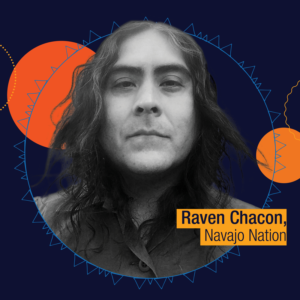Catalyst Grant helped propel Pulitzer-winning composition
May 17, 2022
Navajo composer Raven Chacon has won the 2022 Pulitzer Prize in music for a composition made possible in part by a Catalyst Grant from the Wisconsin Conference UCC.
The piece, “Voiceless Mass,” written for organ and ensemble, was commissioned by the Wisconsin Conference, Plymouth Church UCC in Milwaukee and Milwaukee ensemble Present Music. The piece premiered in November at Present Music’s annual Thanksgiving concert, performed at the Cathedral of St. John the Evangelist in Milwaukee. In his Pulitzer entry, Chacon wrote that he waived a self-imposed rule for the Milwaukee premiere, which came at Present Music’s annual Thanksgiving concert.
“As an Indigenous artist, I make a point not to present my work on this holiday, but in this case I made an exception,” he said. In an interview with NPR after his Pulitzer victory, Chacon said he was drawn to the project by the opportunity to write a piece for the organ, something he had never done before.
“This work considers the spaces in which we gather, the history of access of these spaces, and the land upon which these buildings sit,” Chacon wrote. “Though ‘mass’ is referenced in the title, the piece contains no audible singing voices, instead using the openness of the large space to intone the constricted intervals of the wind and string instruments. In exploiting the architecture of the cathedral, ‘Voiceless Mass’ considers the futility of giving voice to the voiceless, when ceding space is never an option for those in power.”
The Wisconsin Conference’s Catalyst program provides grants of up to $5,000 to support innovative ministries that push beyond church walls, engaging the wider community in work that’s often aligned with the Conference’s social justice mission. Coincidentally, “Voiceless Mass” premiered just a month after United Church Camps, Inc.’s former Pilgrim Center in Green Lake, Wisconsin, was renamed Daycholah Center, using the original Ho-Chunk name for Green Lake. The renaming culminated a years-long initiative to honor the land and the people who first called it home.
New Yorker editor David Remnick, a member of the Pulitzer board, praised the composer, saying, “Chacon goes deep in his musical thinking, and when he sits down to compose he calls on diverse traditions and modes of musical expression.”
In the NPR interview, Chacon acknowledged the spiritual dimension of the piece.
“A lot of native people have also grown up in the Christian church,” he said. “For a lot of us in the Southwest that was the Catholic church. For myself, on a personal level, there is something that happens in these spaces, something that despite the words being spoken in that space, despite the history of the congregation of that space, there’s still, at least for me, an urge to recognize those buildings as places to reflect, places of some kind of sacred gathering. So anytime anybody’s gathering under the purposes of hope, under the purposes of prayer, that for sure becomes something that’s going to influence music inside of these spaces. I was, of course, conscious of that, and that is something that I acknowledged as I was writing the piece.”
‹ Back to News & Updates




Sign up for our newsletter!
Find us on
Contact Us